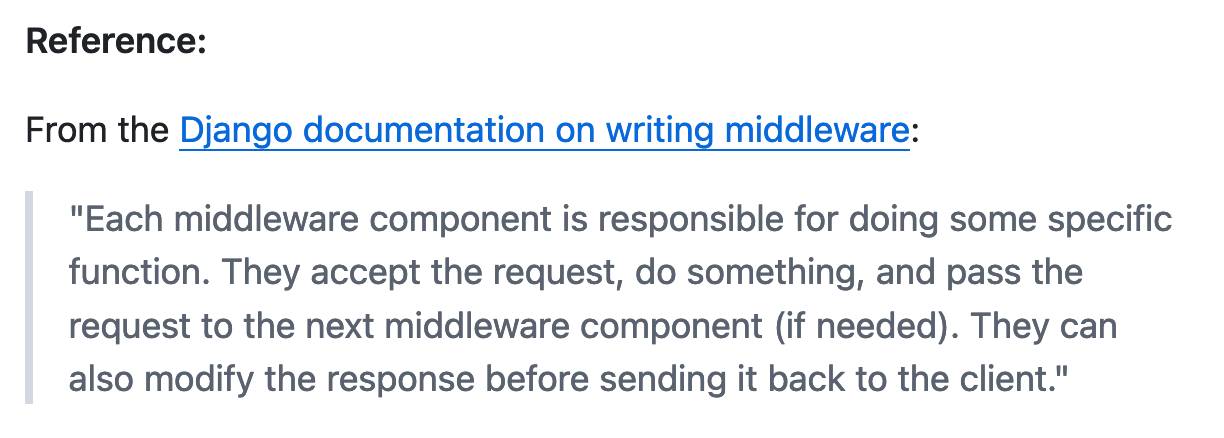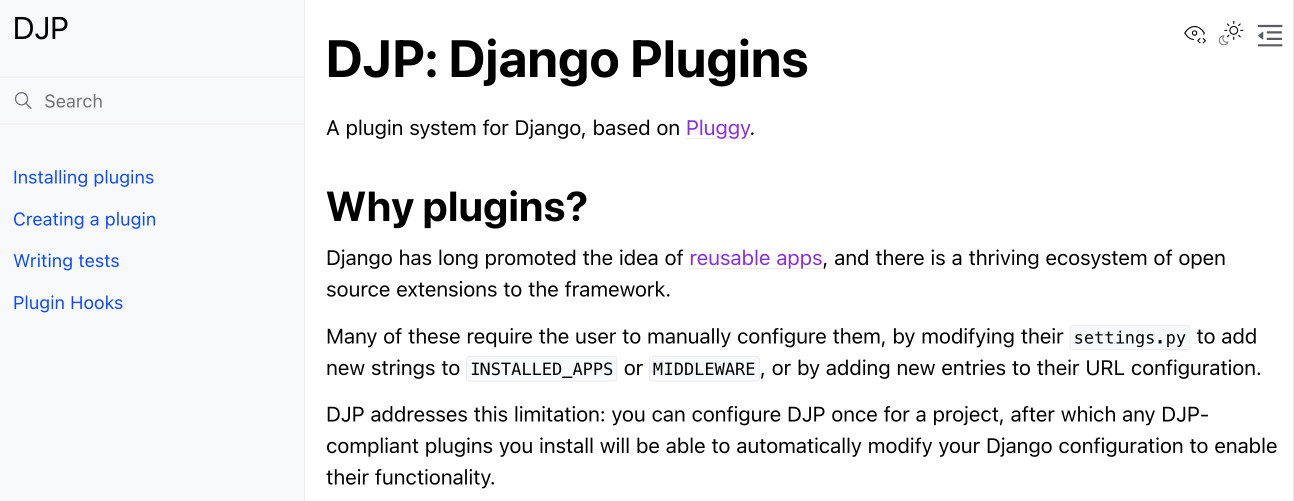5 posts tagged “djp”
DJP is a plugin system for Django.
2024
django-plugin-django-debug-toolbar (via) Tom Viner built a plugin for my DJP Django plugin system that configures the excellent django-debug-toolbar debugging tool.
You can see everything it sets up for you in this Python code: it configures installed apps, URL patterns and middleware and sets the INTERNAL_IPS and DEBUG settings.
Here are Tom's running notes as he created the plugin.
Weeknotes: Three podcasts, two trips and a new plugin system
I fell behind a bit on my weeknotes. Here’s most of what I’ve been doing in September.
[... 693 words]django-plugin-datasette. I did some more work on my DJP plugin mechanism for Django at the DjangoCon US sprints today. I added a new plugin hook, asgi_wrapper(), released in DJP 0.3 and inspired by the similar hook in Datasette.
The hook only works for Django apps that are served using ASGI. It allows plugins to add their own wrapping ASGI middleware around the Django app itself, which means they can do things like attach entirely separate ASGI-compatible applications outside of the regular Django request/response cycle.
Datasette is one of those ASGI-compatible applications!
django-plugin-datasette uses that new hook to configure a new URL, /-/datasette/, which serves a full Datasette instance that scans through Django’s settings.DATABASES dictionary and serves an explore interface on top of any SQLite databases it finds there.
It doesn’t support authentication yet, so this will expose your entire database contents - probably best used as a local debugging tool only.
I did borrow some code from the datasette-mask-columns plugin to ensure that the password column in the auth_user column is reliably redacted. That column contains a heavily salted hashed password so exposing it isn’t necessarily a disaster, but I like to default to keeping hashes safe.
Solving a bug with o1-preview, files-to-prompt and LLM.
I added a new feature to DJP this morning: you can now have plugins specify their middleware in terms of how it should be positioned relative to other middleware - inserted directly before or directly after django.middleware.common.CommonMiddleware for example.
At one point I got stuck with a weird test failure, and after ten minutes of head scratching I decided to pipe the entire thing into OpenAI's o1-preview to see if it could spot the problem. I used files-to-prompt to gather the code and LLM to run the prompt:
files-to-prompt **/*.py -c | llm -m o1-preview "
The middleware test is failing showing all of these - why is MiddlewareAfter repeated so many times?
['MiddlewareAfter', 'Middleware3', 'MiddlewareAfter', 'Middleware5', 'MiddlewareAfter', 'Middleware3', 'MiddlewareAfter', 'Middleware2', 'MiddlewareAfter', 'Middleware3', 'MiddlewareAfter', 'Middleware5', 'MiddlewareAfter', 'Middleware3', 'MiddlewareAfter', 'Middleware4', 'MiddlewareAfter', 'Middleware3', 'MiddlewareAfter', 'Middleware5', 'MiddlewareAfter', 'Middleware3', 'MiddlewareAfter', 'Middleware2', 'MiddlewareAfter', 'Middleware3', 'MiddlewareAfter', 'Middleware5', 'MiddlewareAfter', 'Middleware3', 'MiddlewareAfter', 'Middleware', 'MiddlewareBefore']"The model whirled away for a few seconds and spat out an explanation of the problem - one of my middleware classes was accidentally calling self.get_response(request) in two different places.
I did enjoy how o1 attempted to reference the relevant Django documentation and then half-repeated, half-hallucinated a quote from it:

This took 2,538 input tokens and 4,354 output tokens - by my calculations at $15/million input and $60/million output that prompt cost just under 30 cents.
DJP: A plugin system for Django
DJP is a new plugin mechanism for Django, built on top of Pluggy. I announced the first version of DJP during my talk yesterday at DjangoCon US 2024, How to design and implement extensible software with plugins. I’ll post a full write-up of that talk once the video becomes available—this post describes DJP and how to use what I’ve built so far.
[... 1,664 words]